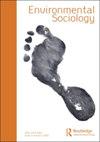在向循环食品和能源系统过渡的过程中规范新的卫生做法
IF 2.8
Q3 ENVIRONMENTAL STUDIES
引用次数: 1
摘要
卫生废水含有几种稀缺资源,可重复用于能源和食品生产。然而,在关于循环粮食系统的辩论中,卫生基础设施往往被忽视,而卫生设施在应对农业面临的资源枯竭方面的作用可能至关重要。将卫生基础设施转变为支持循环系统还需要彻底了解所涉及的卫生做法,因为以资源为导向的卫生系统需要在如何使用厕所和处理废水方面去常规化。相反,围绕卫生的循环发展需要新的卫生实践,以确保废水的再利用潜力。这篇研究论文的重点是探讨卫生实践是如何形成和嵌入更广泛的国内实践中的,以及它对新的卫生实践的常规化的影响。采用混合方法研究设计,研究阿姆斯特丹大都会区内三个不同社区的卫生实践和基础设施。首先,进行了一项调查,使社区类型学得以发展。其次,进行了深入访谈,以揭示卫生做法的内在性。研究结果强调了在将环境卫生与粮食系统联系起来时,规范新的环境卫生做法的重要性,并列出了可能有助于做到这一点的五个基石。本文章由计算机程序翻译,如有差异,请以英文原文为准。
Normalizing novel sanitation practices in transitioning towards circular food and energy systems
ABSTRACT Wastewater from sanitation contains several scarce resources that can be reused for purposes of energy and food production. Sanitation infrastructures, however, are often overlooked in debates on circular food systems, while the role of sanitation could be pivotal in combatting resource depletion facing agriculture. Transitioning sanitation infrastructures to support circular systems also needs a thorough understanding of the sanitation practices involved, as resource-oriented sanitation systems require a de-routinization in how we make use of toilets and deal with wastewater. Instead, novel sanitation practices are needed for circular developments around sanitation to ensure the reuse potential of wastewater. This research paper focuses on exploring how sanitation practices are shaped and embedded in wider configurations of domestic practices and its implications for the routinization of novel sanitation practices. A mixed-method research design has been adopted studying sanitation practices and infrastructures in three distinct neighborhoods within the Amsterdam Metropolitan Region. First, a survey was conducted that enabled the development of a neighborhood typology. Second, in-depth interviews were conducted to uncover the embeddedness of sanitation practices. Results highlight the importance of normalizing novel sanitation practices when linking sanitation to food systems and list five steppingstones that may help doing so.
求助全文
通过发布文献求助,成功后即可免费获取论文全文。
去求助
来源期刊

Environmental Sociology
ENVIRONMENTAL STUDIES-
CiteScore
4.60
自引率
12.00%
发文量
34
期刊介绍:
Environmental Sociology is dedicated to applying and advancing the sociological imagination in relation to a wide variety of environmental challenges, controversies and issues, at every level from the global to local, from ‘world culture’ to diverse local perspectives. As an international, peer-reviewed scholarly journal, Environmental Sociology aims to stretch the conceptual and theoretical boundaries of both environmental and mainstream sociology, to highlight the relevance of sociological research for environmental policy and management, to disseminate the results of sociological research, and to engage in productive dialogue and debate with other disciplines in the social, natural and ecological sciences. Contributions may utilize a variety of theoretical orientations including, but not restricted to: critical theory, cultural sociology, ecofeminism, ecological modernization, environmental justice, organizational sociology, political ecology, political economy, post-colonial studies, risk theory, social psychology, science and technology studies, globalization, world-systems analysis, and so on. Cross- and transdisciplinary contributions are welcome where they demonstrate a novel attempt to understand social-ecological relationships in a manner that engages with the core concerns of sociology in social relationships, institutions, practices and processes. All methodological approaches in the environmental social sciences – qualitative, quantitative, integrative, spatial, policy analysis, etc. – are welcomed. Environmental Sociology welcomes high-quality submissions from scholars around the world.
 求助内容:
求助内容: 应助结果提醒方式:
应助结果提醒方式:


